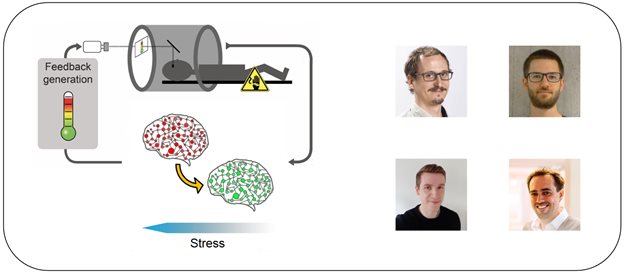
Stress-related mental illness, such as depression and anxiety disorders are amongst those with the highest disease burden, and efforts to reduce their prevalence have remained largely unsuccessful. While recent research has revealed how acute stress leads to a shift in brain-wide network states, these insights have not yet been incorporated into neuroscience-based interventions. This made the authors think: “What if we could directly change how a patient’s brain responds to stress? Or even: What if we could equip patients with the skill to do that themselves?”
In their most recent study, Florian Krause and colleagues investigated the feasibility of directly training – to put it in simple terms – regulating your brain networks away from a “stressed” state using real-time fMRI neurofeedback, as a potential mean to increase stress resilience. The research group led by Erno Hermans from the department of Cognitive Neuroscience published the results in the journal NeuroImage on August 29.
Over the course of three experimental sessions, participants learned to voluntarily control a visually presented neurofeedback signal reflecting the momentary balance between two prominent brain networks involved in stress, by exploring mental strategies of their choice – all while being entirely unaware of both the origin and computation of the feedback signal, as well as the details of the study. Not only did participants show successful self-regulation during the training, they were furthermore able to apply the learned regulation strategies after the training in the absence of any feedback and even when exposed to an acute stressor.
The study results constitute a first successful demonstration of neurofeedback training based on stress-related brain network balance. It is a novel approach that has the potential to strengthen control over the central response to stressors in real-life situations outside of the MRI scanner. Ultimately, it may open up new potential clinical approaches to changing maladaptive stress responses and to promote resilience.

Publication
Krause, F., Kogias, N., Krentz, M., Lührs, M., Goebel, R., & Hermans, E. J. (2021). Self-regulation of stress-related large-scale brain network balance using real-time fMRI neurofeedback. NeuroImage, 243, 118527. https://doi.org/10.1016/j.neuroimage.2021.118527
Related news items

Playing games to control emotions How cognitively demanding tasks can affect emotion regulation
19 April 2022 Cognitive reappraisal can help us to control our emotions. It involves recognizing negative thought patterns, and gradually changing them to more effective patterns. A new study shows how the cognitive load of reappraisal, rather than the reappraisal itself, affects our emotional processing. go to page
The effects of dopamine levels on reward responsivity
25 November 2021 To adapt to the ever-changing context in which we live, we are constantly deciding how much effort to put into performing our behavior, or how fast to perform our actions. How do people decide how fast to act and how does the brain compute this? Our researchers set out to investigate this. go to page
Adverse effects of Mindfulness-Based Cognitive Therapy in bipolar disorder
18 November 2021 Mindfulness is often described as “being aware of our present moment experience, in a friendly and non-judgmental way”. As research into mindfulness, and psychotherapy in general, has mainly been focused on positive outcomes, not much is known about the possibility of adverse effects. go to page
Dutch institutions sign agreement about their research using animals
11 November 2021 Radboudumc, Radboud University and 13 other organisations involved in animal testing in the Netherlands have signed the Dutch Transparency Agreement on Animal Testing. The institutes commit themselves to communicate in a more open way about how animals are used in research. go to page
